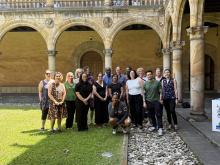Theorizing Carceral Desires, Imagining Non-Carceral Futures: Methodologies and Conceptual Frameworks
Coordinators: Rashmee Singh (Department of Sociology & Legal Studies, University of Waterloo), Timothy Bryan (Department of Sociology, University of Toronto)
Description of the meeting
The proposed workshop will convene an international group of qualitative researchers whose scholarship examines –and aims to imagine solutions that move beyond –the use of the criminal legal system as a remedy for harm, injustice, and socio-economic deprivation. The workshop will build on our current programs of research to develop an international and interdisciplinary network of scholars committed to empirically grounded research and critical criminological frameworks. The workshop will advance socio-legal knowledge and develop new methodological practices in socio-legal studies.
The first theme will focus on the methodological conundrums that researchers attentive to the harms of criminalization confront when their participants invoke the police and courts as not just their only solutions, but their ultimate saviours. This dilemma becomes a paradox when interviewees have their own troubled relationships with the criminal legal system or are themselves criminalized or incarcerated. The workshop will consider how to make sense of these perspectives and desires. We will specifically explore how to ethically represent and theorize narratives that do not align with the social justice objectives we ascribe to and the broader project to de-centre the criminal legal system. In addition, we will examine how researchers can draw on desires for punishment and social control to derive further insights into carceral logics and complicate existing theorizations of the carceral.
The second theme will focus on how researchers can mobilize these accounts to contribute to and develop different imaginaries that think beyond the bounds of carceral systems and practices. In so doing, the objectives will be to destabilize established logics that couple ‘public safety’ with social control, detention, and punishment, and conceptualize new ways to cultivate security, safety, wellness, and social order. This endeavour will not only focus on moving away from traditional criminal legal institutions but will also address the permeation of criminal legal logics into other realms of social life. In focusing on the latter, we hope to include scholars from a variety of disciplines who research topics that include but are not limited to, social welfare systems, schools, borders, and immigration controls. The aim will be to reach beyond the contemporary moment to determine how we can orient participant narratives to generate new insights on social change, methods of redress, and non-carceral futures. The emphasis will be on developing empirically based, theoretical tools that contribute to the project of making abolitionist societies both thinkable and possible.
Our experience in Oñati
When our workshop was accepted to be part of the 2025 schedule, we were thrilled. Our workshop aimed to bring together a group of international scholars grappling with challenges around conducting research on carceral institutions in ways that imagine futures where we can live beyond carcerality. We aimed to hold a workshop where scholars could not only present finished work, but could also present works in progress, new ideas, and challenging questions emerging from their research in a positive, scholarly environment.
We are hugely indebted to the kind, professional, and organized staff at the IISL for the logistical and planning support that was integral in making this workshop a success. The staff at the Institute helped with travel arrangements, assisted us with the development of our workshop materials, maintained constant communication with participants, organized all our accommodations, and even provided helpful tips on places to see and eat while in Oñati. Staff also made accommodations so that we could hold interactive circle-based activities in the workshop space. An especially big thank you to Malen Gordona who went above and beyond to welcome us to the IISL and Oñati and orient us to the town.
Because all the logistical support was handled by the IISL, the workshop ran extremely smoothly, which allowed us to focus on our research and develop both scholarly and personal connections with one another. We were so pleased as organizers to see all of our participants connect not only as academics, but also as friends. The workshop facilities, room set up, technology, coffee and snacks were fantastic and even the minor details like personalized water bottles, pens, and note pads made the experience extra special. We hope we are able to return to the IISL for another workshop. It was a huge success.
Workshop Coordination Team
Avenida de la Universidad, 8
Apartado 28
20560 Oñati (Gipuzkoa) - Spain
T: +34 943 78... Ver teléfono
E: workshop@iisj.es




